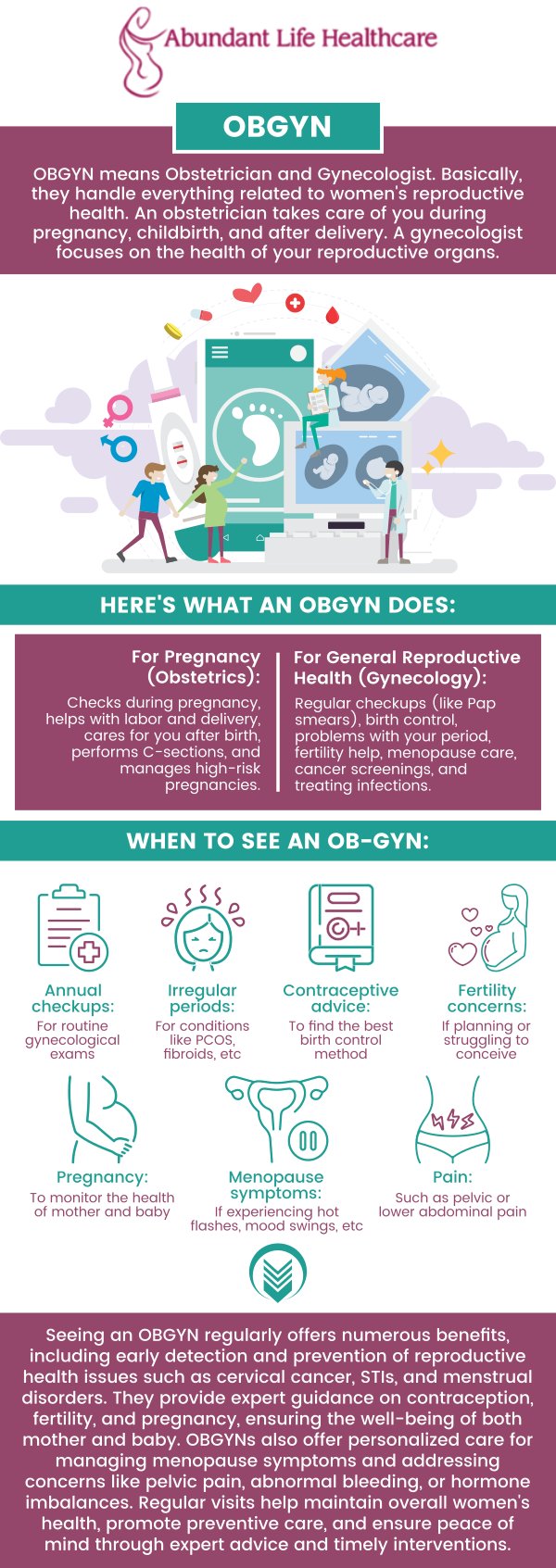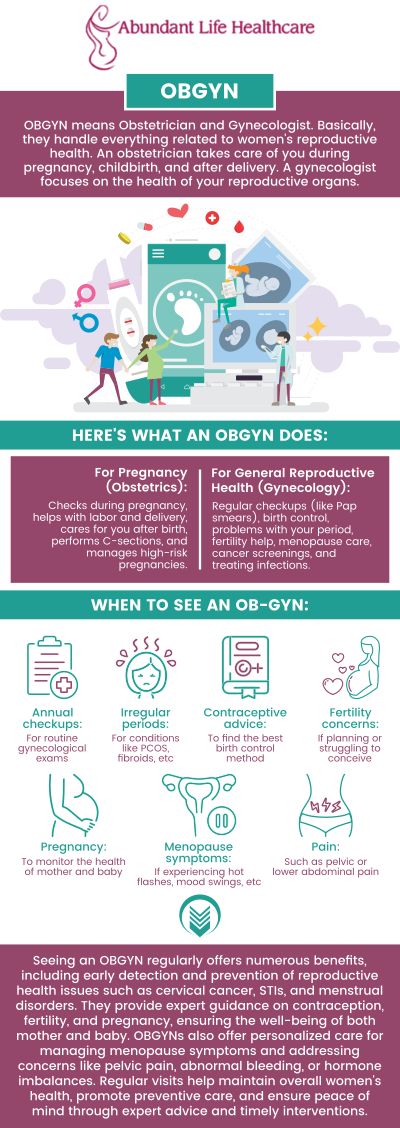How Often Should You See An OBGYN?
Regular visits to your OBGYN are crucial for maintaining optimal reproductive health. Dr. Marc Jean-Gilles, DO, FACOG, and our team at Abundant Life Healthcare recommend annual check-ups for preventive care, early detection of any issues, and personalized treatment plans. With our compassionate approach and comprehensive services, we prioritize your well-being at every appointment, ensuring peace of mind and proactive management of your health. Schedule your next visit with us to stay on top of your reproductive health journey. For more information, contact us today or book an appointment online. We are conveniently located at 601A Professional Drive, Suite 370, Lawrenceville, GA 30046.




Table of Contents:
How often should a woman go to the OBGYN?
Is it necessary to see a gynecologist every year?
How often should you see a gynecologist when pregnant?
How often should I see my gynecologist after 40?
At what age should a woman stop seeing a gynecologist?
At Abundant Life Healthcare, understanding the importance of regular visits to an OBGYN is crucial for maintaining women’s health at every stage of life. From adolescence through menopause, these appointments serve not only as a means to address reproductive health concerns but also as a preventive measure against potential health issues. Whether it’s your first visit or you’re scheduling a routine check-up, knowing how often to see your OBGYN is a key part of managing your health and wellness.
The frequency of OBGYN visits varies depending on age, health status, and life stages. Generally, it is recommended for women to have their initial visit during their teenage years, usually between the ages of 13 and 15. After this, women should schedule annual appointments to ensure their reproductive health is monitored closely through regular pelvic exams, Pap smears, and other necessary screenings. These annual visits play a critical role in the early detection of diseases and managing health concerns such as menstrual irregularities, birth control, and pre-conception counseling. However, the frequency may increase for women experiencing pregnancy, postpartum, health issues like infections or hormonal imbalances, or those undergoing menopause, necessitating visits that cater to their unique health requirements during these periods.
Yes, seeing a gynecologist annually is highly recommended for maintaining optimal women’s health. These yearly appointments allow for a proactive approach to health care, focusing on prevention and early detection of any potential issues. During these visits, a comprehensive review of your health, including a pelvic exam, a breast exam, and potentially a Pap smear, depending on your age and health history, is conducted. This regularity ensures that any changes in your reproductive health are monitored, and any concerns can be addressed promptly. It also offers a valuable opportunity for open discussion about reproductive health, sexual health, contraception, and planning for pregnancy. Even in the absence of symptoms or concerns, these annual check-ups play a vital role in identifying issues that may not yet be noticeable, ensuring that each individual receives the necessary care to maintain their health over time.
During pregnancy, the frequency of visits to a gynecologist significantly increases to closely monitor the health of both the mother and the developing fetus. It is generally recommended that pregnant women have their first prenatal visit around 6 to 8 weeks of pregnancy. In the initial stages of pregnancy, visits may be scheduled every four weeks. This frequency increases as the pregnancy progresses, with visits recommended every two to three weeks between the 28th and 36th week, and then weekly from the 36th week until delivery. These visits are critical for tracking the baby’s growth, assessing the mother’s health, and discussing any symptoms or health concerns. Additionally, these appointments allow healthcare providers to conduct necessary prenatal testing to detect any potential issues early, ensuring that both the mother and the baby receive the best possible care during this crucial time.
After reaching the age of 40, the recommendation for how often a woman should see her gynecologist may adjust based on individual health needs and risk factors. Generally, it is advisable to continue with annual visits as these appointments remain essential for monitoring changes in reproductive health, conducting screenings for cervical cancer, and discussing symptoms that may indicate menopause or perimenopause. Around this age, women may also be advised to start mammogram screenings for breast cancer, under their health history and risk levels. Additionally, this period marks a crucial time for discussing and managing symptoms related to hormonal changes, including options for managing menopausal symptoms. Therefore, maintaining regular gynecological care during this time is paramount to addressing any new health concerns and continuing to promote overall wellness.
There is no specific age at which a woman should stop seeing a gynecologist. Gynecological care is a critical component of a woman’s health throughout her entire life. It adapts to her changing needs from reproductive years through menopause and beyond. Even after menopause, regular visits to a gynecologist remain important for monitoring and managing post-menopausal symptoms, screening for cancers such as breast, ovarian, and uterine cancer, and ensuring overall pelvic health. Age should not be a deterrent to seeking advice and preventative care. Remember, gynecological health is about more than reproductive ability; it’s about maintaining wellness and quality of life at every age. If you have questions about your gynecological health or are due for a visit, don’t hesitate to call us or book an appointment online at Abundant Life Healthcare. We’re here to support you in managing your health through every stage of life.
With our compassionate approach and comprehensive services, we prioritize your well-being at every appointment, ensuring peace of mind and proactive management of your health. Schedule your next visit with us to stay on top of your reproductive health journey and experience the benefits of personalized care and support from our expert team at Abundant Life Healthcare. For more information, contact us today or book an appointment online. We are conveniently located at 601A Professional Drive, Suite 370, Lawrenceville, GA 30046. We serve patients from Lawrenceville GA, Suwanee GA, Snellville GA, Duluth GA, Dacula GA, Lilburn GA, Loganville GA, Auburn GA, and surrounding areas.
Check Out Our 5 Star Reviews


Additional Services You May Like

Additional Services You May Like
- Obstetrics
- Pregnancy
- Gynecologist
- Birth Control
- Labiaplasty
- Microblading
- Weight Loss
- Semaglutide GLP-1
- Pap Smears
- Pelvic Pain
- Laser Hair Removal
- In House Ultrasound (Including 3D)
- Vaginal Birth After C-Section (VBAC)
- Pregnancy As High Risk
- Multiple Gestations
- Postpartum Counseling
- 24hour/365days On Call Service
- Annual Exam
- Abnormal Uterine Bleeding
- Management Of Endometriosis
- Ultrasound
- Pelvic Organ Prolapse
- Urinary Incontinence
- Perimenopause And Menopause
- Sexual Dysfunction
- Fat Freeze (Like Cool Sculpting)
- Body Contouring
- Ozempic
- Civil Surgeon
- Hormone Replacement Therapy
- Immigration Medicine
- Biote Hormone Pellets
- GLP-1
- Peptide Therapy




